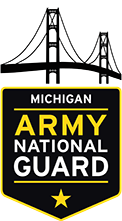- Home
- Services
- Officer Programs
- Reserve Officer Training Corps
Reserve Officer Training Corps
Simultaneous Membership Program/Reserve Officer Training Corps
The Simultaneous Membership Program (SMP) allows selected enlisted members of the Army National Guard to simultaneously participate in any Army ROTC program. Being an SMP allows you to earn your drill pay, which is paid at the rate of Sergeant (E5, or your current rank if higher), understudy with a unit officer and perform officer duties, contract as cadet, and earn the ROTC benefits.
Michigan ROTC Universities
- Central Michigan University – (517) 730-4273
- Eastern Michigan University – (734) 554-4608
- Ferris State University – (231) 510-4280
- Michigan State University – (734) 308-1568
- Michigan Tech – (906) 487-2650
- Northern Michigan University – (906) 227-2236
- Western Michigan University – (248) 563-5843
- University of Michigan – (734) 657-3159
SMP/ROTC Benefits
- Pay grade starting at E5 (higher if you’re at a higher pay grade)
- Michigan National Guard State Tuition Assistance Program (MINGSTAP) up to $14,400 per year
- Federal Tuition Assistance (FTA) up to $4,000 per year
- Montgomery GI Bill minimum $300 per month and can exceed $1,000
- Montgomery GI Bill Kicker adds $350 per month to your existing GI Bill benefit
- Stipend between $350/$500 per month depending on your school status (sophomore through senior year)
- Guaranteed Reserve Forces Duty (GRFD) Scholarship as offered by your school
- Dedicated Army National Guard (DEDNG) Scholarship as offered by your school
- Tuition Grant Program as offered by your school
Reserve Officer Training Corps
Guard Soldiers may be exempt from ROTC Basic Course (MS I & II) because of military training and experience. Instead, Guard Soldiers may qualify to enroll directly into Advanced ROTC (MS III & IV). During the school week, SMP Cadets participate in all ROTC classes, labs and field training exercises. On training weekends, SMP Cadets are mentored in their assigned unit. During these weekends, Cadets wear their ROTC designation and carry out duties of new 2LTs in a supervised, on-the-job training environment.
Attend College
The next step is to be accepted and attend a college or university offering Reserve Officer Training Corps (ROTC) courses.
Once this is accomplished:
- Complete an SMP Agreement Contract before your Sophomore or Junior year
- Take the contract to your school’s ROTC department and enroll in the ROTC Advanced Course (the Advanced Course averages seven hours per week; one 2 hour class, one 2 hour lab, and 3 hours of physical fitness)
- Begin ROTC classes
- Continue attending Guard unit training assemblies
ROTC Camp
Basic Course
Basic Course refers to freshman and sophomore level ROTC classes; Military Science (MS) I and II. These classes cover subjects like military history, traditions and organizations, and national defense. A strong emphasis on leadership development is prevalent the first two years. This offers a unique opportunity for students to gain hands on leadership skills while in college.
Advanced Course
This final phase consists of the last two years of the ROTC program, MS III and IV. The curriculum focuses on preparation for the challenges of military leadership. To enter this course, you must have already completed one of the following:
- Army Basic Combat Training
- Basic Leadership Training Course
- Complete MS I & II
During your Junior year, you will combine classroom instruction and practical application focusing on land navigation, military tactics and how to prepare and present operation orders. Your Senior year focuses on Cadet leadership positions, leadership challenges and preparation to become a 2LT. You will also be responsible for training and evaluating Cadets currently going through MS I & II.
Advanced Camp
After completion of Military Science III (Junior year), SMP Cadets attend a six-week ROTC Advanced Camp at Fort Knox, KY instead of AT. This segment of a Cadet’s training provides one third of the evaluation for accession and branch selection at commissioning. Here you will train to Army standards, refine leadership skills, and evaluate officer potential. This phase is intentionally tough and stressful. The days are long with considerable night training. Throughout, a Cadet encounters physical and mental obstacles, challenging him/her as a person, Soldier, and leader. Training information:
- Primarily conducted in small unit, tactical sessions
- Sequenced in a logical, building block manner
- Covers basic military skills for leading Soldiers in tactical environments
- Forces Cadets to serve in positions of leadership from squad to company level
- Serves as a basis to evaluate Cadets on their leadership, organization and teamwork abilities
- Allows camp instructors ample opportunities to advise, coach and evaluate a Cadet’s potential.
After camp
- Return to school for Senior year
- Enroll in and complete Military Science IV
Graduation
Once classes are complete, SMP Cadets can apply for graduation and receive their commission as Second Lieutenants (2LT) in the Army National Guard or United States Army.

 FAQs
FAQs APPLY ONLINE
APPLY ONLINE CONTACT US
CONTACT US